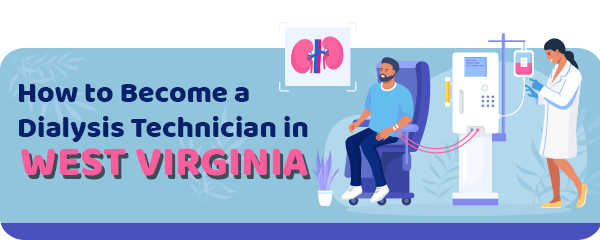
Without dialysis machines and the skilled individuals to operate them, the lives of many people would be at risk.
While the work of manipulating dialysis machines may not seem glamorous, it is an exceptionally rewarding occupation for those who are passionate about helping others.
If you’re interested in learning more about this profession, you’ve come to the right place.
Please continue reading to find comprehensive information.
Article Table of Contents
Dialysis Technician Job Description in West Virginia
Selecting a profession without a clear understanding of its responsibilities is unwise.
For prospective dialysis technicians in West Virginia, it’s essential to comprehend the nature of their work.
These professionals primarily focus on patients with kidney-related issues.
Their core responsibilities involve ensuring the proper functioning of dialysis machines and operating them in accordance with each patient’s unique needs.
You’ll also be expected to complete these tasks:
- Monitoring the vital signs of patients
- Assisting patients throughout the dialysis procedure
- Ensuring the safety and comfort of patients
- Reviewing patients’ medical history to identify potential concerns during the procedure
- Adjusting dialysis machines to suit individual patient needs
- Administering oxygen when necessary
- Basic Cardiopulmonary Resuscitation (CPR) if required
These tasks represent a portion of the common responsibilities of dialysis technicians.
On a daily basis, the specific duties may vary.
Dialysis Technician Requirements in West Virginia
In West Virginia, individuals pursuing a career as dialysis technicians operate within the jurisdiction of the private sector.
Although West Virginia does not impose rigid training or certification mandates on dialysis technicians, these professionals must adhere to the instructions provided by the Centers for Medicare and Medicaid Services.
The CMS outlines the key prerequisites for prospective dialysis technicians, including:
- High school diploma or GED
- Training
- Credentialing
- Competency Standards of Practice
- Licensure or certification
- Gaining work experience
Certification must be obtained within 18 months of commencing employment.
Candidates pursuing national-level recognition can achieve certification through examinations offered by the following organizations:
- The Nephrology Nursing Certification Commission (NNCC).
- Certified Clinical Hemodialysis Technician (CCHT) Exam.
- The Board of Nephrology Examiners Nursing and Technology (BONENT).
- Certified Hemodialysis Technician (CHT) Exam.
- The National Nephrology Certification Organization, Inc. (NNCO).
- Certified in Clinical Nephrology Technology (CCNT) Exam.
- Certified in Biomedical Nephrology Technology (CBNT) Exam.
In West Virginia, certification typically involves both written and practical exams.
Certified technicians must also complete continuing education courses every two years and pass a recertification exam every four years.
Dialysis Technician Training Schools in West Virginia
Prospective dialysis technicians in West Virginia begin their journey by graduating from high school or obtaining a GED.
These next high school subjects are relevant for this occupation:
- Biology,
- Chemistry,
- Medical terminology
- Anatomy
- Physiology
However, the formal training process commences at post-secondary educational institutions, including vocational schools, community colleges, or technical institutes.
The curriculum focuses on topics including:
- Principles of dialysis
- Care for patients with kidney failure
- Management of potential complications during dialysis
- Water treatment and dialysate preparation
- Infection control
- Safe dialyzer reprocessing
Typically, an appropriate training program spans approximately a year.
Approved training institutions within West Virginia can be found through a thorough search.
Calhoun Community College 
The college offers a comprehensive 50-hour training program, which aspiring students can complete through two distinct pathways:
- Online
- A traditional classroom setting.
For the online option, tuition costs $1,299 and includes e-books.
This program must be successfully completed within a span of 6 months.
In contrast, the classroom alternative is priced at $999, covering both tuition and essential textbooks.
Classes for this option are conducted on Mondays and Wednesdays, commencing at 6 p.m.
It’s essential to note that refunds are exclusively applicable to in-person classes.
Auburn University 
Auburn University provides a fully online dialysis technician program with a tuition fee of $3,000.
This cost encompasses a wide array of valuable resources.
Here are the most important of them:
- Round-the-clock mentoring support,
- Opportunities for national and state certifications,
- Self-paced learning
- Interactive learning modules,
- Various learning exercises,
- Access to career resources,
Students are expected to successfully complete their coursework within a flexible time frame of up to 6 months.
Alabama State University 
ASU has an online program for future dialysis techs.
It is specially designed for the Certified Hemodialysis Technicians (CHT) exam, administered by the Board of Nephrology Examiners Nursing and Technology (BONENT).
Those taking this course should ensure that it aligns with their respective state’s regulatory requirements.
The total tuition cost for this program is $4,190, which can be paid in convenient installments.
The program comprises 205 hours of training, to be completed within a year, accommodating individualized learning paces.
Notably, the course includes comprehensive CPR training and certification, facilitated by the Red Cross.
Course content covers subjects like:
- The Cardiovascular System
- The Urinary System
- The Endocrine System
- The Reproductive System
- Infection Control
- Principles of Hemodialysis
| School Name | Address |
|---|---|
| Calhoun Community College | online |
| Alabama State University | online |
| Auburn University | online |
Dialysis Technician Salary in West Virginia
Understanding potential income is an important aspect of considering any career path.
Entry-level dialysis technicians can anticipate an average salary of approximately $46,000 in West Virginia.
To identify specific areas within the state where salaries may be higher, please refer to the table below.
Annual Salary Range:| Location | Avg. Annual Salary |
|---|---|
| Bakerton | $56,600 |
| Summit Point | $56,600 |
| Ridgeway | $56,600 |
| Baker | $51,800 |
| Wardensville | $51,800 |
| Yellow Spring | $51,800 |
| Rio | $51,800 |
| Wheeling | $50,000 |
| Weirton | $49,800 |
| Aurora | $48,500 |
Regional Salary in West Virginia
| Region | Employed | Avg. Annual Salary | Avg. Hourly Pay | Top 10% Annual Salary | Bottom 10% Annual Salary |
|---|---|---|---|---|---|
| Beckley, WV | 140 | $51,490 | $24.76 | $72,110 | $30,420 |
| Charleston, WV | 250 | $58,460 | $28.11 | $86,840 | $35,710 |
| Huntington-Ashland, WV-KY-OH | 340 | $58,830 | $28.29 | $84,160 | $34,390 |
| Morgantown, WV | 290 | $59,430 | $28.57 | $78,150 | $34,940 |
| Weirton-Steubenville, WV-OH | 70 | $70,190 | $33.75 | $89,290 | $38,820 |
| Wheeling, WV-OH | 130 | $55,450 | $26.66 | $73,120 | $34,840 |
* Employment conditions in your area may vary.
Frequently Asked Questions
Where Does a Dialysis Technician in West Virginia Find Work?
There are many different settings where a dialysis technician can find employment.
The following locations are the most common:
- Hospitals
- Dialysis centers
- Outpatient clinics
- Home healthcare agencies
Which Other Skills Are Required for a Dialysis Technician in West Virginia?
Dialysis techs must possess a series of skills and abilities.
These include:
- Attention to details
- Excellent communication
- Empathy
- Patience
- Compassion
- Technical mind
Do I need a license or a certification to work as a dialysis technician in West Virginia?
In West Virginia, individuals only need a certification recognized at the national level if they want to work as dialysis technicians.
Read the full guide: How to Become a Dialysis Technician